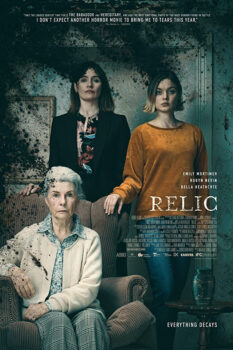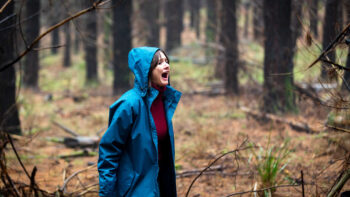Movie Review: Relic (NZIFF 2020)
Relic is often as infuriating as it is terrifying, with exquisite set pieces and visuals flattened by inconsistency and an original, horrifying story left hanging in the land of potential through a weak, forgettable script.
Dir: Natalie Erika James
Starring: Emily Mortimer, Robyn Nevin, Bella Heathcoate, Chris Bunton, Jeremy Stanford
 There is so much to say about Relic, the chilling directorial-debut from Natalie Erika James, which feels surprising from a film that says so little itself. The opening moments of the film show infinite promise; the measured camera pacing, heartbeat rhythm of flashing Christmas-tree lights, bodily twitching and torturous soundtrack are enough to stir up Hereditary-levels of fearful excitement.
There is so much to say about Relic, the chilling directorial-debut from Natalie Erika James, which feels surprising from a film that says so little itself. The opening moments of the film show infinite promise; the measured camera pacing, heartbeat rhythm of flashing Christmas-tree lights, bodily twitching and torturous soundtrack are enough to stir up Hereditary-levels of fearful excitement.
We then meet Kay (Emily Mortimer) and Sam (Bella Heathcote), a mother and daughter driving to their remote family home in search of Edna (Robyn Nevin), the widowed matriarch of the family who has recently been reported missing. Kay’s visit to the local police station compounds on the style of the film’s opening, where tension-building cinematography and patience allow the scene to unfold alongside our growing anxiety.
Sandwiched between these two exquisite scenes was the first jarring feeling from the film as a whole; a collection of action sequences with Kay and Sam arriving and searching through the abandoned family home.
T he majority of the action-focussed scenes throughout the film suffer from the same awkward editing, framing, and confused tone as you find in great student films or low-budget horror: rapid close-ups of a hand twisting on a banister as a character descends, security-camera-angle hallway shots, strangely bright natural light contrasting with zero interior light, close-ups on plot devices and anti-climactic combinations of these long, haunted shots and hand-held camera shakes.
he majority of the action-focussed scenes throughout the film suffer from the same awkward editing, framing, and confused tone as you find in great student films or low-budget horror: rapid close-ups of a hand twisting on a banister as a character descends, security-camera-angle hallway shots, strangely bright natural light contrasting with zero interior light, close-ups on plot devices and anti-climactic combinations of these long, haunted shots and hand-held camera shakes.
This doesn’t begin to touch on the dialogue, which feels like it’s constantly forcing tension when it’s unneeded by wrapping lengthy topics in brevity. The tone of the film feels as though the conversations should be maddening bland and crushingly defeatist, but each scene is filled with juicy side-stories that just seem unnecessary; Sam going to university or moving into the family home, Kay looking at a nursing home in the city, and Edna having random confessional outbursts just distract from the simple terror already on offer.
 The final 30 minutes of the film is a slow-building descent into madness and pure dread, with Heathcote’s performance in particular dialling up the intensity with genuine terror at her discovery. As with all of these moments of redemption in the film – which I wished would make my previous judgements feel foolish – it unravels by trying to do too much, explain too much, tie everything up yet still leave it open to interpretation.
The final 30 minutes of the film is a slow-building descent into madness and pure dread, with Heathcote’s performance in particular dialling up the intensity with genuine terror at her discovery. As with all of these moments of redemption in the film – which I wished would make my previous judgements feel foolish – it unravels by trying to do too much, explain too much, tie everything up yet still leave it open to interpretation.
Frustratingly, all of these issues are also inconsistent – there is so much quality and potential littered throughout Relic that it’s impossible not to wish it had a touch more (or less) development. Its brilliant moments are far too good to relegate the film into enjoyable low-budget cinema, and it’s terrible moments are far too jarring to forgive.
In the end, what could have been a disorienting, cinematic expression of grief and madness became bloated with excessive, unfinished story-lines, branching out to find meaning and reason to the characters and their stories when it could have cut it all out, let us wallow in the crushing anxiety of its slow-paced moments, and leave us feeling uneasy about the skin we live in.
Relic is showing as part of the NZ International Film Festival. For tickets/online access, please go HERE.
Oxford Lamoureaux
- The Dead South – Powerstation: April 5, 2024 (Concert Review) - April 6, 2024
- Queens of The Stone Age – Spark Arena: February 29, 2024 (Concert Review) - March 1, 2024
- Dune: Part Two – Dir: Denis Villeneuve (Film Review) - February 29, 2024
